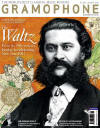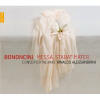Texte paru dans: / Appeared in:
*

GRAMOPHONE (01/2013)
Pour s'abonner /
Subscription information
Naïve
OP30537

0709861305377 (ID247)
Consultez toutes les évaluations recensées pour ce cd
~~~~ Reach all the evaluations located for this CD
Reviewer: David Vickers
Alessandrini uncovers Giovanni Bononcini’s brother
Antonio Maria Bononcini (1677-1726) was the younger brother of the celebrated opera composer Giovanni. Both studied in Bologna, relocated to Rome and thereafter flourished in Berlin and Vienna; Giovanni became Handel’s colleague in London, whereas Antonio eventually settled as the court maestro di cappella in Modena. His contrapuntally complex Stabat mater for four-part voices and strings has been recorded a few times before but never with the assured qualities of Concerto Italiano’s masterful performance — although there are a few brief moments of dodgy tuning from the violins in the opening chorus (the only blatant gremlin of this live recording made at Vienna’s Konzerthaus). Expressive arias such as the florid ‘Eia, mater, fons amoris’ are strikingly juxtaposed with diverse choral movements that range from affectionate charm (‘Virgo virginum praeclara’) to emotionally plaintive fugues of exemplary workmanship (‘Paridisi gloria’).
The unpublished five-part Mass has never been recorded before.
Rinaldo Alessandrini praises its ‘synthesis between ecclesiastical arid operatic
styles’. Concerto Italiano’s lean strings and two assertive theorbos make a
telling impact throughout the Mass, and the 17-strong Choir of Concerto Italiano
sing precisely and expressively (a beautiful setting of Agnus Dei);
movements sung by single voices include a sublime ‘Qui tollis’ and elsewhere
there are some surprising sonorities, such as an inventive low trio for two
tenors and bass (‘Domine Deus, Rex coelestis’). These distinguished performances
reveal exactly the kind of unfairly neglected repertoire that the Early Music
Revival was invented for.
Fermer la fenêtre/Close window
Cliquez l'un ou l'autre
bouton pour découvrir bien d'autres critiques de CD
Click either button for many other reviews


